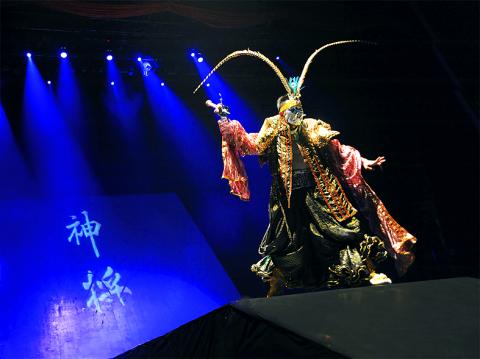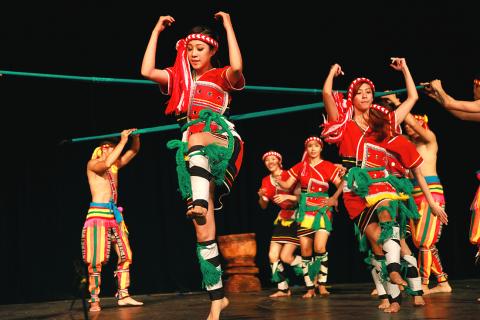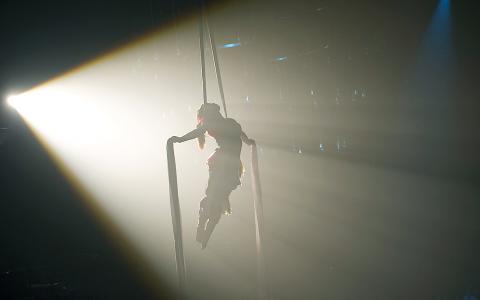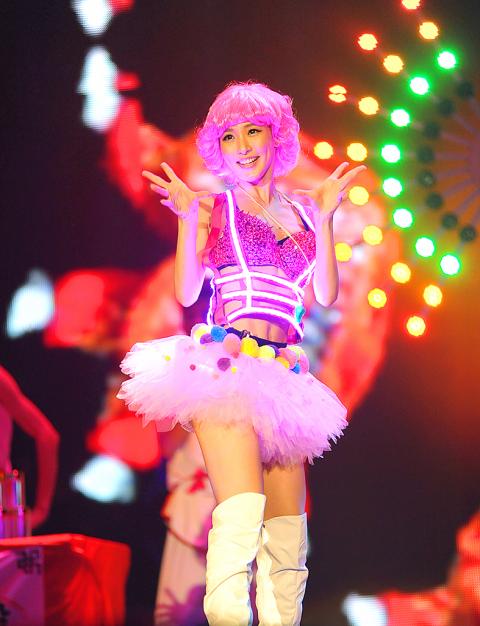London has the West End. New York has Broadway. For a quick theater fix on a visit to Taipei, visitors don’t have a great deal of choice. NK101, based out of a converted film studio in Nankang next to the building of the China Television Company, is trying to fill this market segment with an ongoing performance titled Formosa Fantasy: The Amazing Night of Taiwan, a spectacle that seeks to imitate the high wire acrobatics and tongue-in-cheek humor of hyper successful shows such as the Cirque du Soleil.
Over the last few years, the government has been making a concerted, if not altogether successful effort to encourage the creation of big shows with long runs that are able to attract tourists and locals looking for theatrical entertainment who are not necessarily regular theatergoers.
The term “fixed title theater” (定目劇) has been widely used to describe the aim of creating such theater events. Strictly speaking, this term is translated as “repertory theater,” but the idea is very different from what repertory connotes in the English theatrical tradition.

Photo courtesy of NK101
Contemporary Legend Theater’s (當代傳奇劇場) Legend Opera II series of performances at the Auditorium of the Chiang Kai-shek Memorial Hall (see Taipei Times Sept. 27, p12) is one attempt to achieve this aim with a mixture of traditional and modernized productions of Beijing Opera running over a period of three months. Other companies, most notably the restaging of the social comedy Can Three Make It (三人行不行) by Ping Fong Acting Troupe (屏風表演班) as part of the Huashan Living Arts Festival (華山藝術生活節), proved that for shows that somehow manage to hit exactly the right note, it is possible for long-running shows to make a respectable box office.
TOURIST APPEAL
Formosa Fantasy: The Amazing Night of Taiwan is quite different from these performances in that it has been designed particularly to appeal to tourists. In this respect it is similar to the Taipei Eye (台北戲棚) performances, which present a showcase of traditional arts four days a week and has established itself as a popular stop on the tourist itinerary (more information can be found at www.taipeieye.com).

Photo courtesy of NK101
Formosa Fantasy: The Amazing Night of Taiwan mixes these traditional arts with something akin to the Crazy Horse review in Paris, aiming to be spectacular, inviting, titillating and lighthearted, rather than attempting to educate audiences into the complexities of Beijing opera or nanguan music. It has also sought to break down the staid formality of the proscenium and brings the show into the main body of the auditorium in which audiences sit at wooden tables sipping tea and enjoying a selection of preserved fruit.
MADE IN TAIWAN
According to Carol Dai (戴家雯), manager for marketing and promotion, Formosa Fantasy: The Amazing Night of Taiwan was conceived primarily as a commercial venture aimed at filling a market niche for visitors to Taipei, and it is aimed very much at the growing numbers of visitors from China.

Photo courtesy of NK101
“We specifically wanted to focus on aspects of Taiwanese culture,” Dai said. For that reason, the show opens with a dance segment built around Taiwanese temple culture, has a variety review centered on traditional night market culture and closes with aboriginal singing and dancing. This puts it in a very different category from Taipei Eye, with its focus on high culture, mostly of Chinese origin.
“Chinese tourists are familiar with this kind of format,” Dai said, referring to the vaudeville supper show of the Lao She Tea House (老舍茶館).
The Formosa Fantasy: The Amazing Night of Taiwan aims to provide something that is both easily accessible and memorable for visitors to Taiwan. Audiences are offered a personal tray with tea and preserved fruit when they are seated, and both are continually topped up by attentive staff. The show gets underway at 8:30pm, a later time slot than most theater performances in Taipei, which makes allowances for a proper pre-show dinner.

Photo courtesy of NK101
POP CULTURE
The local culture aspect of the production hits top gear almost immediately with loud electronic music that has now become an inseparable subculture of traditional temple events in the guise of the electric-techno neon gods (電音三太子). The show is introduced by an MC dressed in a neon god costume, the Taiwan-style diction, mixed in with copious quantities of Taiwanese phraseology, lending the show, to Chinese-speakers at least, a strongly local flavor. For others, English and Japanese introductions are provided on big screens to either side of the main stage.
Following the neon god come the eight generals, sumptuously attired, making use of traditional acrobatics enhanced with the use of bungee cords to provide a spectacular aerial element. Smoke machines, strobe lights and laser light all work overtime, and massive drums and gongs provide a wall of noise that summons up the atmosphere of a traditional religious event in full swing.
BETEL NUT BEAUTIES
The night market review tries hard to maintain the spectacle and the pace, but is largely forced to fall back of titillating dances by “betel nut beauties,” also lit up in neon, and some traditional acrobatics, and big dance numbers highlighting Taiwan’s individual take on dance club style.
Formosa Fantasy: The Amazing Night of Taiwan strives relentlessly to entertain, and given that the production was put together in just over a month, and the whole NK101 project has been in preparation for less than half a year, it has achieved a remarkable level of high-end gloss and efficiency. While it’s big, brash show may not be to everybody’s taste, it has managed to showcase some aspects of modern Taiwanese culture to which tourists have limited exposure.
Admission for Formosa Fantasy: The Amazing Night of Taiwan begins at 7:30pm; the show starts at 8:30pm and lasts for 90 minutes. Ticketing and other information can be found at: www.nk101.com.

On April 26, The Lancet published a letter from two doctors at Taichung-based China Medical University Hospital (CMUH) warning that “Taiwan’s Health Care System is on the Brink of Collapse.” The authors said that “Years of policy inaction and mismanagement of resources have led to the National Health Insurance system operating under unsustainable conditions.” The pushback was immediate. Errors in the paper were quickly identified and publicized, to discredit the authors (the hospital apologized). CNA reported that CMUH said the letter described Taiwan in 2021 as having 62 nurses per 10,000 people, when the correct number was 78 nurses per 10,000

May 5 to May 11 What started out as friction between Taiwanese students at Taichung First High School and a Japanese head cook escalated dramatically over the first two weeks of May 1927. It began on April 30 when the cook’s wife knew that lotus starch used in that night’s dinner had rat feces in it, but failed to inform staff until the meal was already prepared. The students believed that her silence was intentional, and filed a complaint. The school’s Japanese administrators sided with the cook’s family, dismissing the students as troublemakers and clamping down on their freedoms — with

As Donald Trump’s executive order in March led to the shuttering of Voice of America (VOA) — the global broadcaster whose roots date back to the fight against Nazi propaganda — he quickly attracted support from figures not used to aligning themselves with any US administration. Trump had ordered the US Agency for Global Media, the federal agency that funds VOA and other groups promoting independent journalism overseas, to be “eliminated to the maximum extent consistent with applicable law.” The decision suddenly halted programming in 49 languages to more than 425 million people. In Moscow, Margarita Simonyan, the hardline editor-in-chief of the

Six weeks before I embarked on a research mission in Kyoto, I was sitting alone at a bar counter in Melbourne. Next to me, a woman was bragging loudly to a friend: She, too, was heading to Kyoto, I quickly discerned. Except her trip was in four months. And she’d just pulled an all-nighter booking restaurant reservations. As I snooped on the conversation, I broke out in a sweat, panicking because I’d yet to secure a single table. Then I remembered: Eating well in Japan is absolutely not something to lose sleep over. It’s true that the best-known institutions book up faster